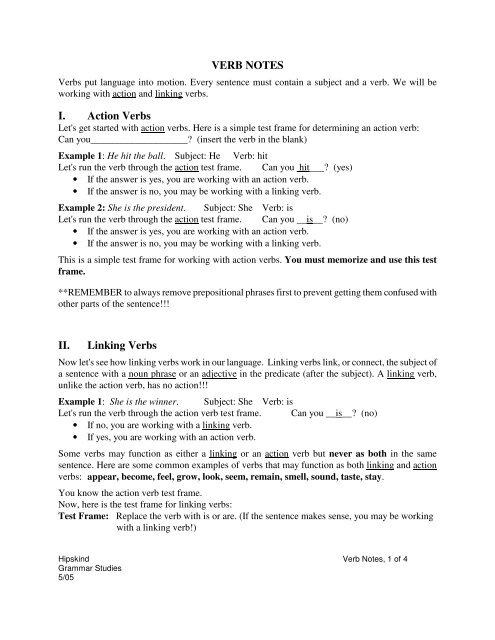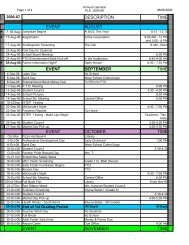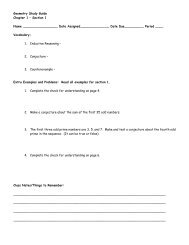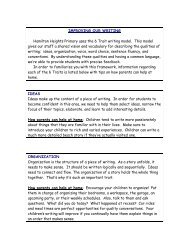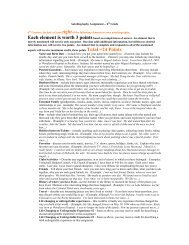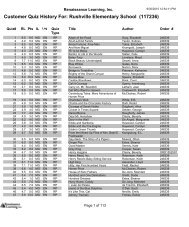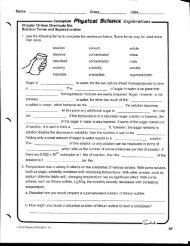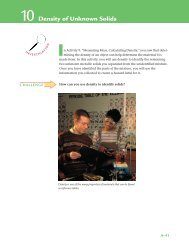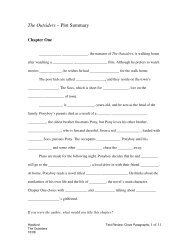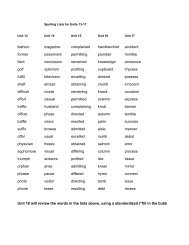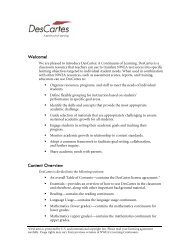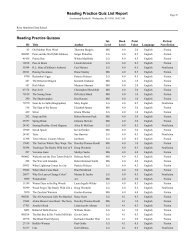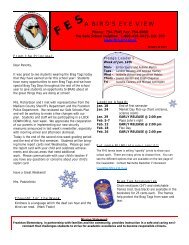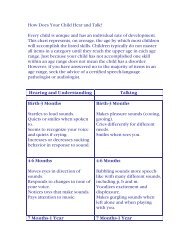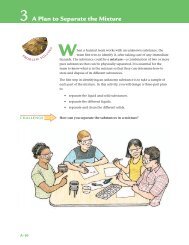VERB NOTES I. Action Verbs II. Linking Verbs - EZWebSite
VERB NOTES I. Action Verbs II. Linking Verbs - EZWebSite
VERB NOTES I. Action Verbs II. Linking Verbs - EZWebSite
Create successful ePaper yourself
Turn your PDF publications into a flip-book with our unique Google optimized e-Paper software.
<strong>VERB</strong> <strong>NOTES</strong><br />
<strong>Verbs</strong> put language into motion. Every sentence must contain a subject and a verb. We will be<br />
working with action and linking verbs.<br />
I. <strong>Action</strong> <strong>Verbs</strong><br />
Let's get started with action verbs. Here is a simple test frame for determining an action verb:<br />
Can you____________________? (insert the verb in the blank)<br />
Example 1: He hit the ball. Subject: He Verb: hit<br />
Let's run the verb through the action test frame. Can you hit___? (yes)<br />
• If the answer is yes, you are working with an action verb.<br />
• If the answer is no, you may be working with a linking verb.<br />
Example 2: She is the president. Subject: She Verb: is<br />
Let's run the verb through the action test frame. Can you __is__? (no)<br />
• If the answer is yes, you are working with an action verb.<br />
• If the answer is no, you may be working with a linking verb.<br />
This is a simple test frame for working with action verbs. You must memorize and use this test<br />
frame.<br />
**REMEMBER to always remove prepositional phrases first to prevent getting them confused with<br />
other parts of the sentence!!!<br />
<strong>II</strong>.<br />
<strong>Linking</strong> <strong>Verbs</strong><br />
Now let's see how linking verbs work in our language. <strong>Linking</strong> verbs link, or connect, the subject of<br />
a sentence with a noun phrase or an adjective in the predicate (after the subject). A linking verb,<br />
unlike the action verb, has no action!!!<br />
Example 1: She is the winner. Subject: She Verb: is<br />
Let's run the verb through the action verb test frame. Can you __is__? (no)<br />
• If no, you are working with a linking verb.<br />
• If yes, you are working with an action verb.<br />
Some verbs may function as either a linking or an action verb but never as both in the same<br />
sentence. Here are some common examples of verbs that may function as both linking and action<br />
verbs: appear, become, feel, grow, look, seem, remain, smell, sound, taste, stay.<br />
You know the action verb test frame.<br />
Now, here is the test frame for linking verbs:<br />
Test Frame: Replace the verb with is or are. (If the sentence makes sense, you may be working<br />
with a linking verb!)<br />
Hipskind Verb Notes, 1 of 4<br />
Grammar Studies<br />
5/05
<strong>Linking</strong> verbs continued.<br />
Let's take a look at how these verbs can be linking and action.<br />
Example 2: They sounded the alarm. Subject: They Verb: sounded<br />
Let's run the verb through the action verb test frame. Can you __sound__? (yes)<br />
Let's run the verb through the linking verb test frame.<br />
• They are the alarm.<br />
• They are not the alarm.<br />
The linking verb test does not work. Sound is an action verb.<br />
*REMEMBER: <strong>Linking</strong> verbs will link or equate the subject to a noun phrase or an adjective in the<br />
predicate!<br />
To determine if a verb is either linking or action run the verb through both test frames.<br />
ACTION<br />
Can you______________?<br />
Insert verb in blank. If you can answer yes, the verb is an action verb.<br />
LINKING<br />
Replace the verb with is or are<br />
If the sentence makes sense, you probably have a linking verb.<br />
These test frames are not 100% accurate, but they do increase your chances of determining verb<br />
types greatly! STAY FOCUSED AND THINK!!!<br />
<strong>II</strong>I. DIRECT OBJECTS (more work with action verbs)<br />
Sometimes when a verb "expresses" action, something or someone "receives" that action. The who<br />
or what that receives the action is called a direct object. The verb that "sends" the action to a noun or<br />
a pronoun is called a transitive verb.<br />
Hipskind Verb Notes, 2 of 4<br />
Grammar Studies<br />
5/05
TRANSITIVE <strong>VERB</strong>S REQUIRE DIRECT OBJECTS!<br />
Example 1: Mary hit the ball. Subject: Mary Transitive Verb: hit<br />
Let's run the verb through the action test frame.<br />
Can you __hit__? (yes)<br />
An action verb is either transitive or intransitive. Remember transitive verbs require direct objects.<br />
Here is the DIRECT OBJECT test frame:<br />
_____________________<br />
(insert verb here)<br />
what?<br />
whom?<br />
Insert the verb and ask whom or what. If you can answer the verb with a noun or a pronoun, you<br />
have a direct object.<br />
Example 2: Mary hit the ball.<br />
hit what? ball Here, ball is the direct object. The word "hit" is a transitive verb.<br />
Remember always mark off prepositional phrases first so they will not be used as any other part of a<br />
sentence.<br />
Example 3: Mary swims in the pool. Prepositional phrase: in the pool Subject: Mary<br />
Verb: swims Can you __swim__? (yes)<br />
Now test to see if you have a direct object.<br />
swim what? swim whom?<br />
There is no noun or pronoun to answer the questions.<br />
Here, "swims" is intransitive. The verb does not "send" action to a noun or pronoun!<br />
We now know how to test verbs for action, and we know that transitive verbs require direct objects!<br />
We also know how to test for linking verbs. Now we will learn about linking verb complements.<br />
IV.<br />
<strong>Linking</strong> Verb Complements<br />
<strong>Linking</strong> verb complements are either noun phrases or adjectives that name or describe the subject of<br />
a sentence.<br />
REMEMBER:<br />
1. A <strong>Linking</strong> Verb is like an equal (=) sign!<br />
2. The subject will equal the linking verb complement!<br />
3. <strong>Linking</strong> verbs have no action<br />
Hipskind Verb Notes, 3 of 4<br />
Grammar Studies<br />
5/05
Example 1: He is the winner. Subject: He Verb: is<br />
He = winner "winner" is a noun<br />
Example 2: He is hungry. Subject: He Verb: is<br />
He = hungry "hungry" is an adjective<br />
"winner" and "hungry" are linking verb complements!<br />
To determine if a verb is linking or action run the verb through the test frames.<br />
V. SUMMARY:<br />
1. Mark off prepositional phrases<br />
2. Find the subject and the verb<br />
3. Determine verb type: linking or action<br />
4. If action, check for direct object<br />
5. If there is a direct object, verb is transitive<br />
6. If linking, check if complement is a noun phrase or adjective<br />
YOU CAN DO THIS. STAY FOCUSED AND THINK!<br />
Hipskind Verb Notes, 4 of 4<br />
Grammar Studies<br />
5/05


